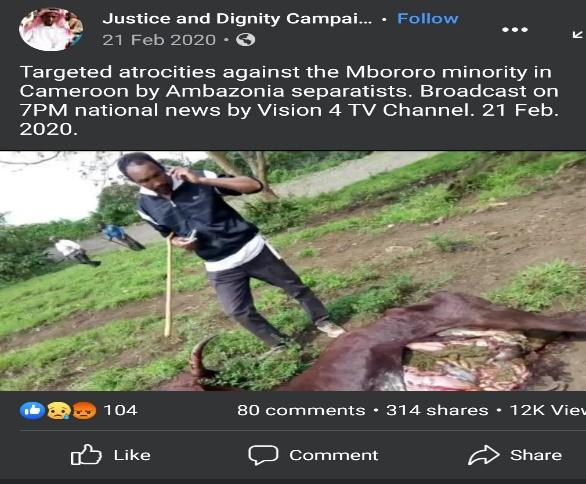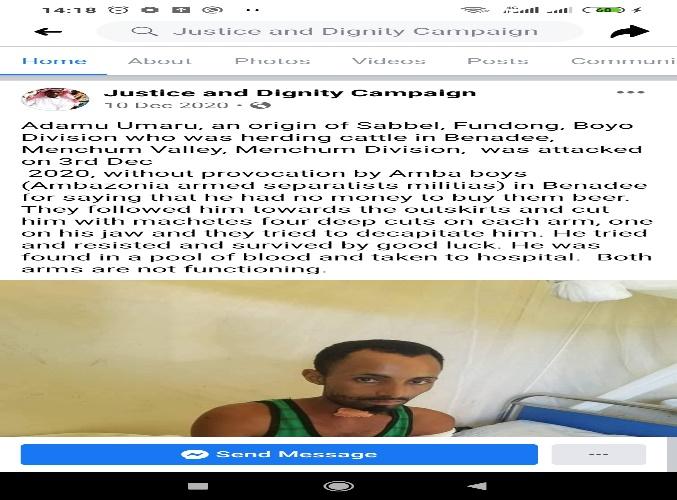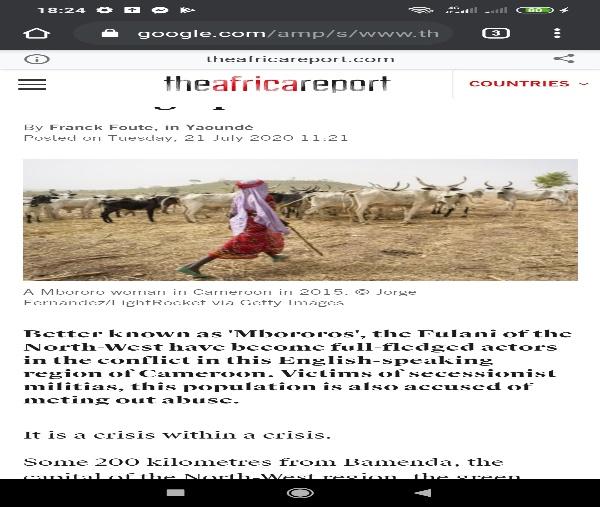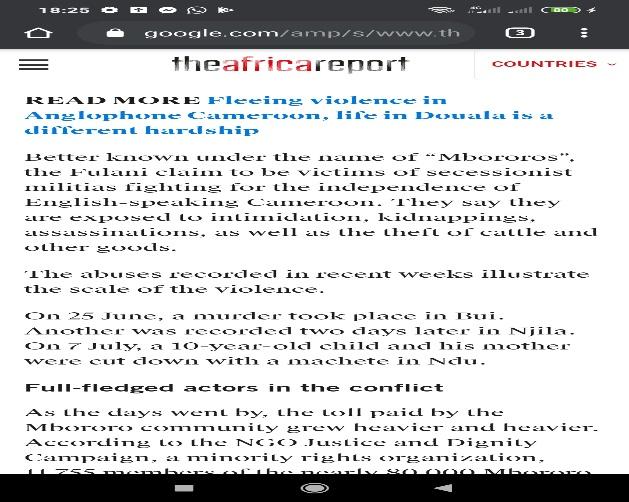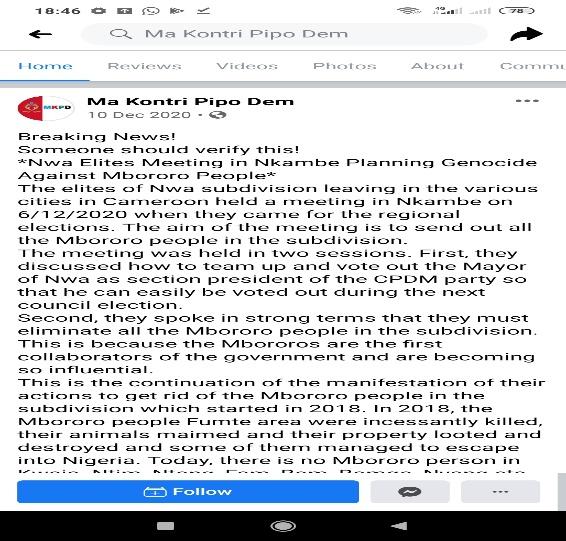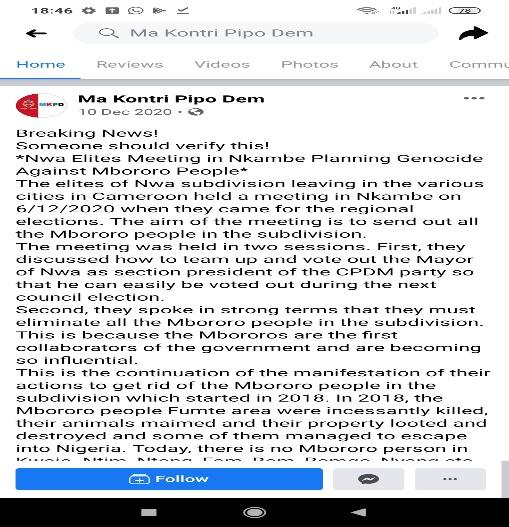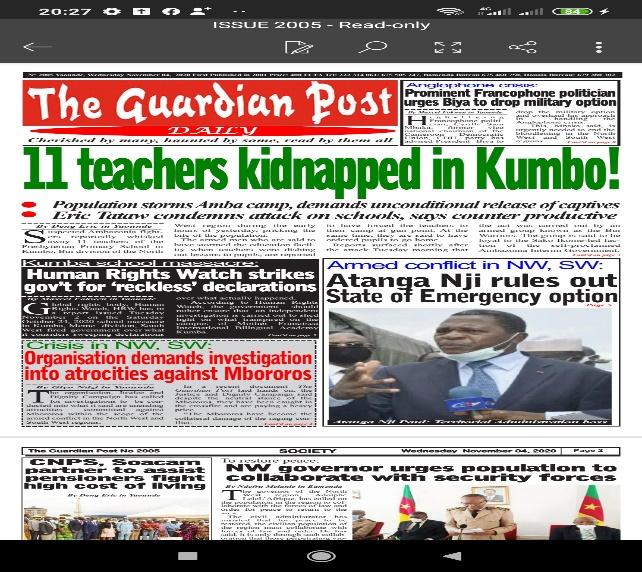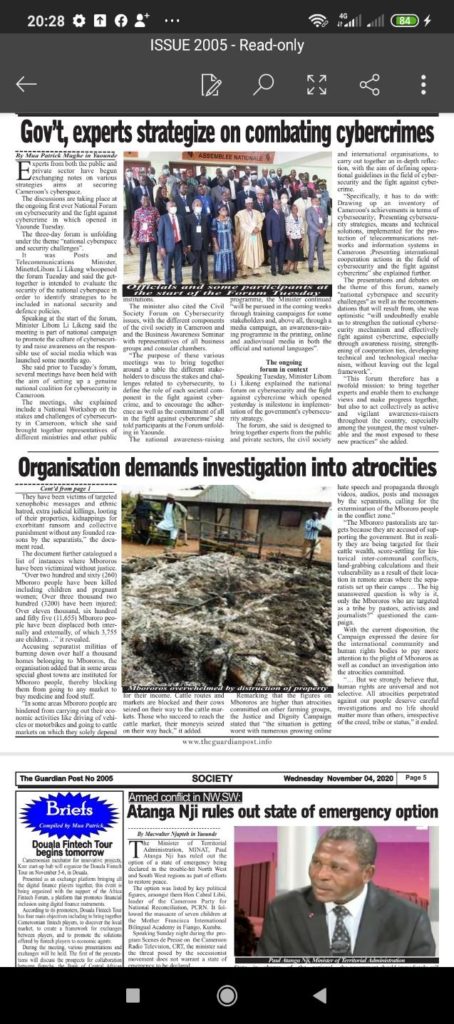How Social Media has influenced attacks on the Mbororo Community within the context of the Anglophone Crisis
The crisis in the Northwest and Southwest regions of Cameroon, now four years old, started in 2016 when lawyers and teachers took to Buea and Bamenda’s streets to protest the French language dominating Anglophone courts and schools. The strike action gained public support and turned into a popular uprising demanding political reforms in November 2016.
The situation escalated on October 1, 2017, when militant secessionist groups, led by Julius Sisiku Ayuke Tabe symbolically proclaimed a new nation’s independence, including the two Anglophone regions called Ambazonia. The war turned bloody when secessionist fighters on the ground armed themselves and launched attacks against security forces, and later civilians got caught between the two.
Clashes between the Cameroon military and separatist fighters have led to over 3,000 deaths and displaced persons internally and externally. Others fleeing for their lives due to being termed sellouts, and recently the attacks have been more severe on the minority pastoralists Mbororo community. Many of them fled to the West Region of Cameroon and other areas when they became targets with attacks, looting, seizure of property and burning down of some.
According to Justice and Dignity Campaign, a minority rights non-governmental organisation, 11,755 members of the nearly 80,000 Mbororo living in the northwest have been forced to leave the region because of the violence. The same organisation counts at least 250 people killed, all Fulani, since the beginning of the crisis in 2016. According to the same source, 475 houses have been burned down and 2,600 head of cattle killed. More than 150 million CFA francs have also been paid to secessionist groups as ransom. A heavy toll, making this community one of the most affected by the Anglophone crisis.
Social media has contributed to fueling this suspicion of Mbororos by Secessionist fighters working with the military leaving them more exposed. Lots of these attacks have been reported in the North West region, with little or nothing seen on social media about such attacks from the South West Region.
Tensions between the Mbororo and farmer communities in the North West are worsening as separatists continue pointing accusing fingers and claiming the government has armed the Mbororo. Within the crisis, they suffered hostage-taking, killings, maiming of cattle, and destruction of property.
The first incident that went viral on social media was Sali in Bambili village of Tubah Subdivision of the North West Region in September 2019. This herdsman’s corpse made rounds on social media accusing him of being a Blackleg (a term used to label those considered not supporting the secessionists’ ideals or working with the security forces). Sali was dragged from up the hills in Bambili where he was based and shot behind the neck and on his side. The killers accused him of sharing information about their hideouts with the security forces. He was second out of close to 60 on the list of Mbororo and Fulanis killed by separatists fighters as shared on the Facebook page of “Justice and Dignity Campaign”. https://m.facebook.com/JusticenDignity/photos/list-of-innocent-mbororo-and-hausa-muslims-murdered-by-ambabzonia-militias-amba-/2489400057768950/?locale=ja_JP.
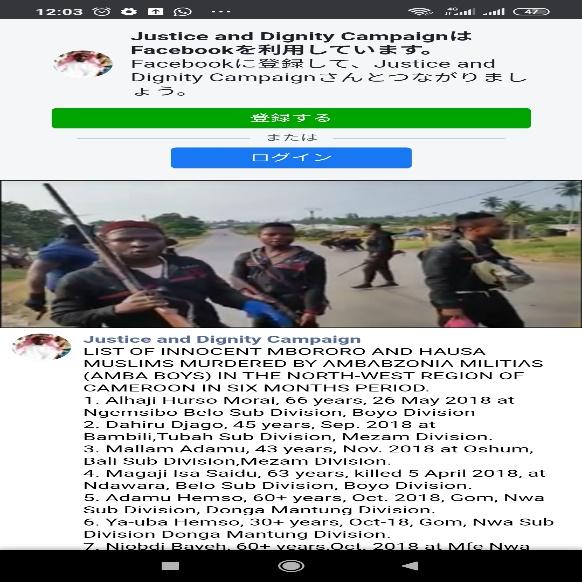
The Refugees International Organization reports Cameroon’s Northwest, Southwest crisis ignites a new fault line of conflict, referring to the growing tension between the Mbororo community and separatist fighters. It highlights Mbororo pastoralists having suffered attacks, including hostage-taking, killings, maiming of cattle, and property destruction. In the last quarter of 2018, this violence caused the displacement of 2500 Mbororos. These confrontations have escalated to clashes between armed separatists and Mbororo fighters, some of whom come from neighbouring Nigeria.
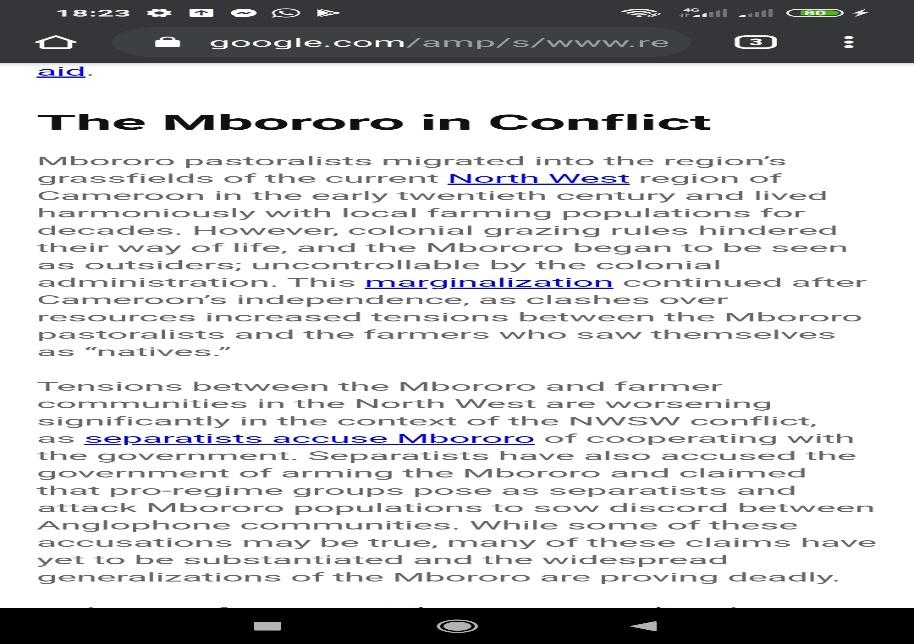
The Justice and Dignity Campaign report these attacks on Mbororos in a video that went viral on YouTube in February 2020 and asked for the excesses to be checked, and perpetrators were severely punished. Another incident was an attack on Umaru Adamu in Menchum Division by separatist as he was herding cattle.
https://www.facebook.com/JusticenDignity/videos/192976065284258/
https://www.facebook.com/266424123399899/posts/4792956287413304/
The African Report highlights a murder in Bui Division of a Mbororo and another in Njila around June 25-28, 2020. A 10-year old child and his mother were butchered with a machete in Ndu Subdivision of Donga Mantung Division. The same organisation counts at least 250 people killed since the beginning of the crisis, with over 150 million CFA francs paid as ransom to secessionist.
Ma Kontri Pipo Dem MKPD, on a Facebook post on December 10, 2020, reported a Nwa Elite Meeting in Nkambe Planning Genocide Against Mbororo People when they came for regional elections. The meeting’s aim, the Facebook post insinuated, was to chase out all Mbororo people in the subdivision.
https://www.facebook.com/100568171533589/posts/190779402512465/
On November 4, 2020, Nfor Ibrahima, in another Facebook post, accused secessionist fighters of Ntamru in Ndu subdivision of the NorthWest region of burning down houses of Ardo and kidnapping the Wakili of the same village for a ransom.
https://www.facebook.com/100568171533589/posts/187543729502699/
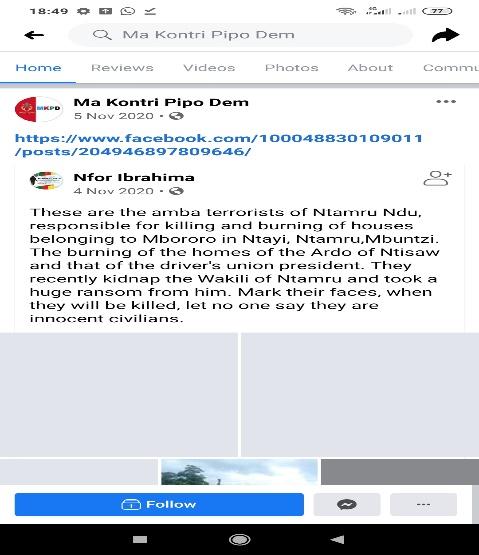
Ma Kontri Pipo posted a picture and video on its Facebook page of an attack on Mbororos, including women and children in Mbokop village of Ndu Subdivision, killing cattle and torturing them on October 3, 2020.
https://www.facebook.com/100568171533589/posts/184155333174872/
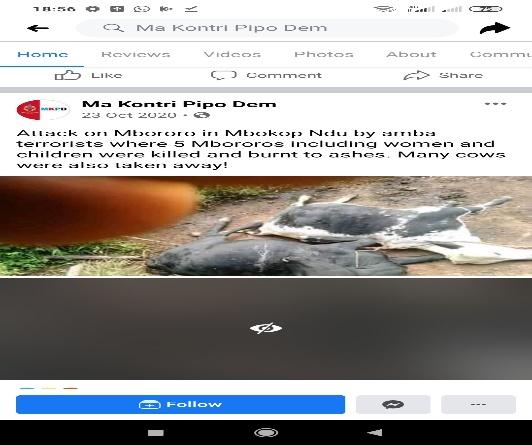
The Justice and Dignity Campaign shared a video on March 21, 2019, on the Cameroon Government addressing the killing of Mbororos at the United Nations offices. The same channel had another video of a report by Vision 4 Television on killing a Mbororo pastoralist by Ambazonian fighters in Mbui-Mbem of Nwa Subdivision.
https://www.facebook.com/JusticenDignity/videos/2612836225410954/
https://www.facebook.com/JusticenDignity/videos/3035672486451395/
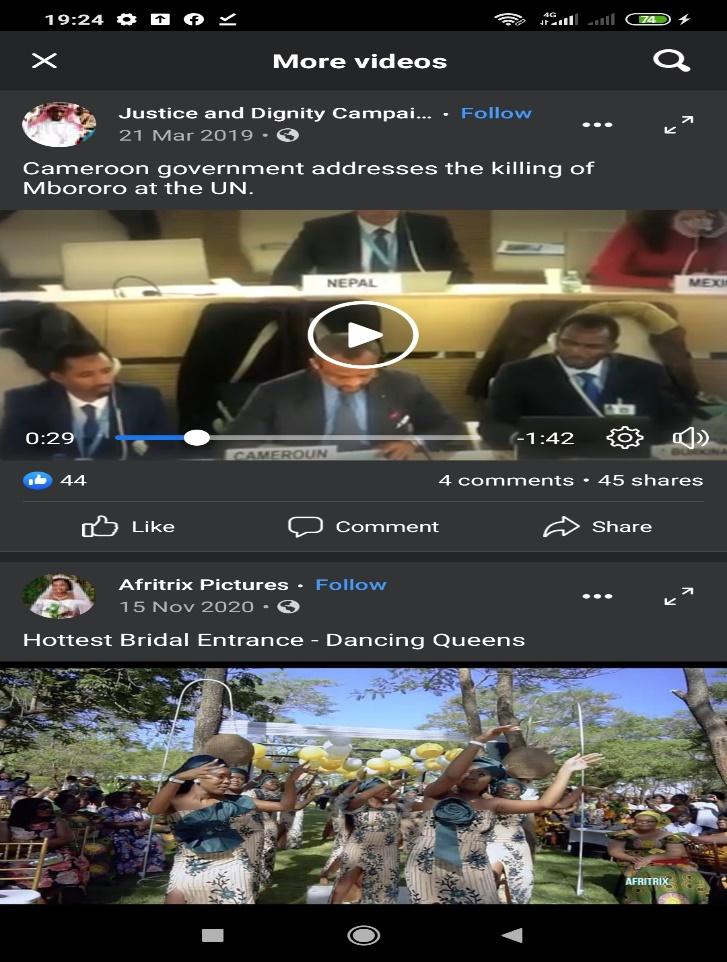
BBC News Randy Joe, in a video report, highlights the attacks on Mbororo herders in Cameroon by Ambazonian fighters with testimonies from the victims themselves. The story aired in September 2018.
https://www.facebook.com/JusticenDignity/videos/261938887786619/
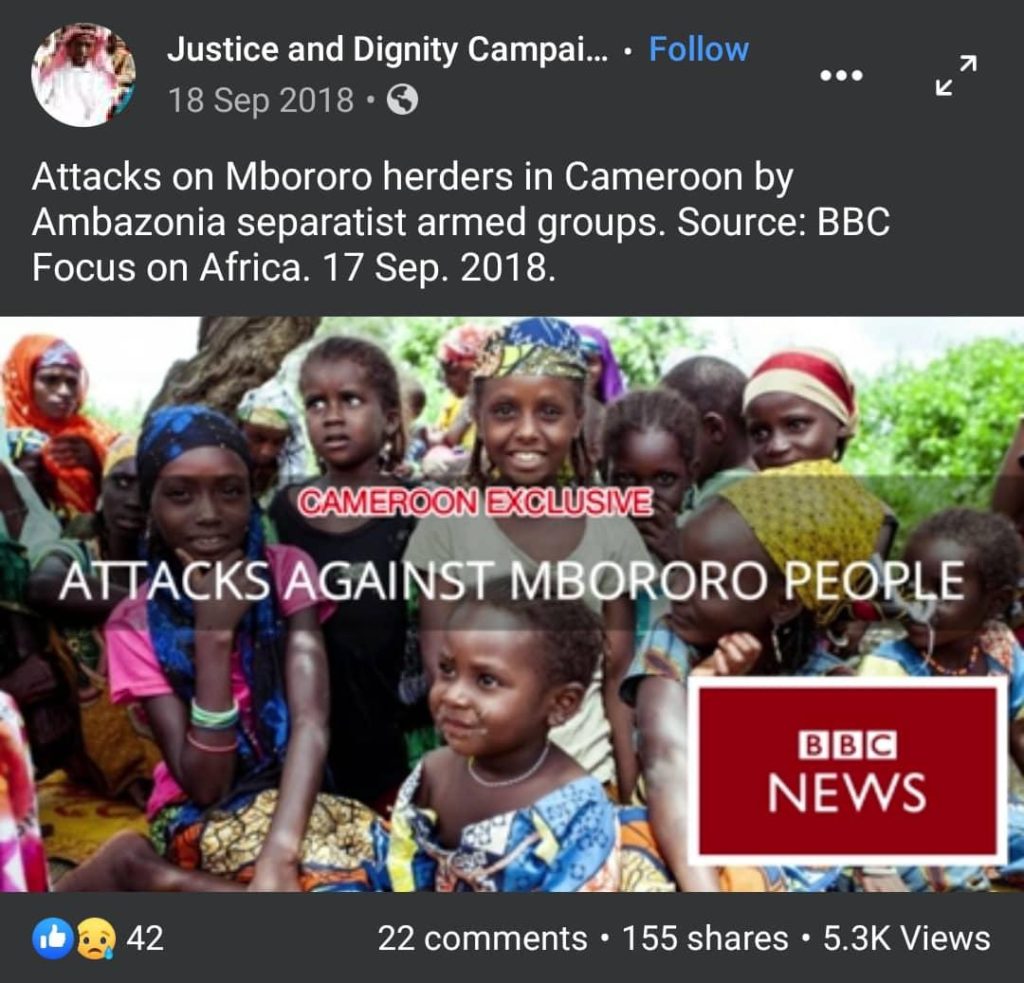
The Guardian Post Newspaper of November 4, 2020, contains a report on the organisation Justice and Peace Campaign demanding an investigation into atrocities against Mbororos with documented evidence
The Chronicle Times Newspaper of November 16, 2020, reports extensively on alleged atrocities by Ambazonian fighters on the Mbororo community in Donga Mantung Division of the North West Region where houses were burnt, children and women shot at, families targeted and killed with a two-month-old baby as a victim, cattle killed as well in Ntayi and Orti Ntisaw villages of Donga Mantung subdivision.
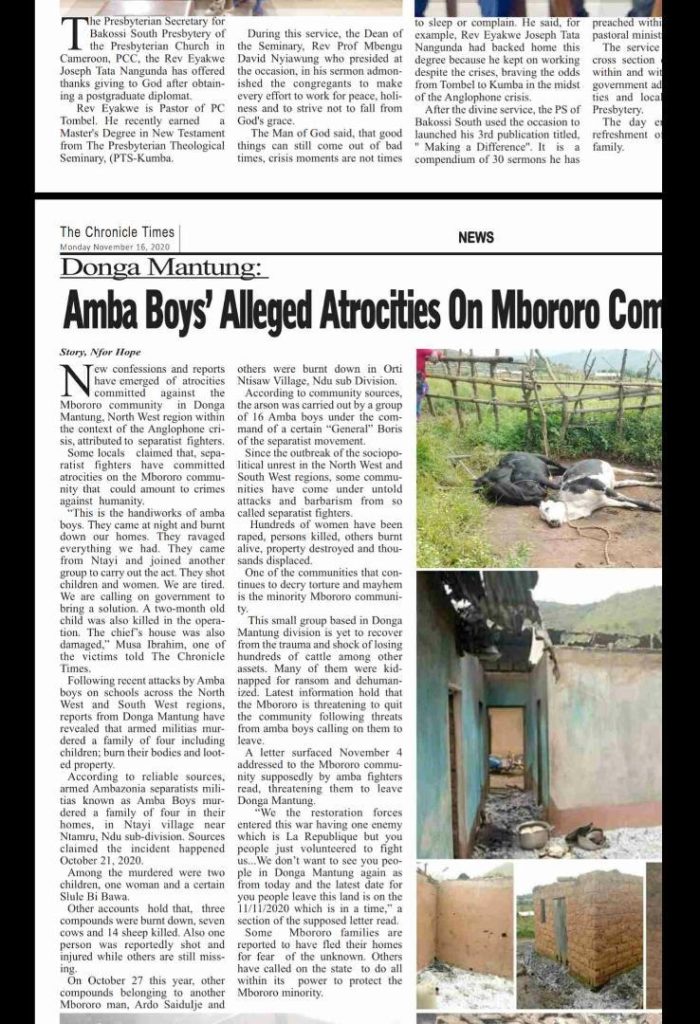
To conclude, many Mbororo families have been forced to flee to neighbouring Nigeria or other French-speaking regions for fear of the unknown due to these frequent attacks. That notwithstanding, the Mbororos in some communities decided to retaliate by attacking the non-Mbororos, which further intensified the tension between them.
In recommendation, the authorities need to seek a lasting solution to the Anglophone crisis and have to be intentional about the peace efforts made towards resolving the crisis. The arming of civilians to fight the atrocities of separatists isn’t helping the course but further intensifying the tension between the minority Mbororos and farming communities.
by Wanchia Cynthia


